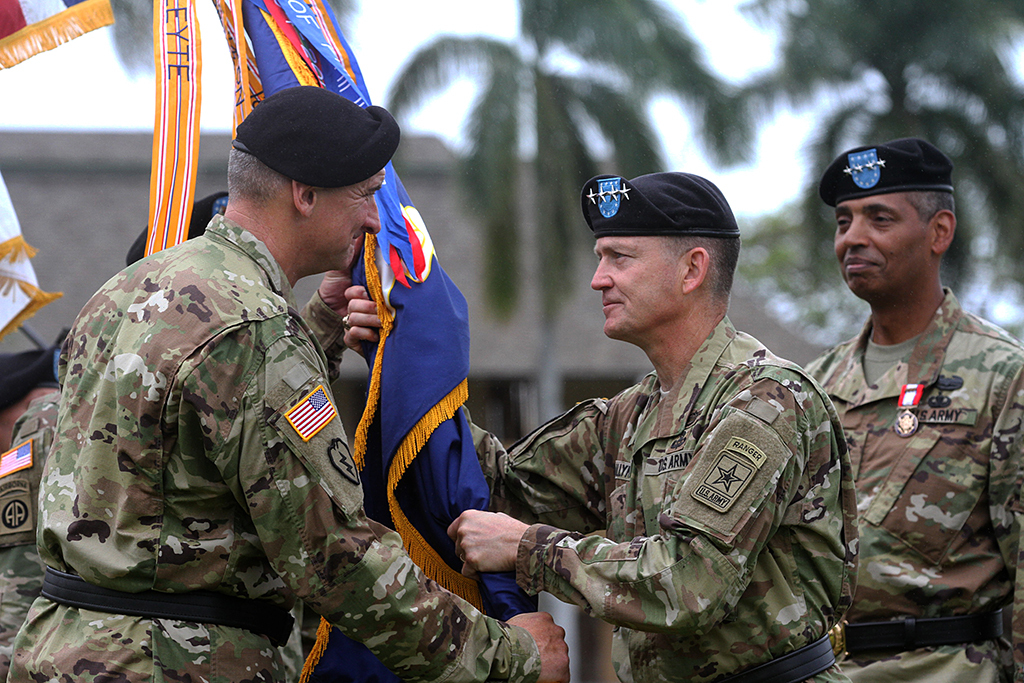AOSSM had the opportunity to speak recently with AOSSM President Dean Taylor, MD, and Gen. Robert Brown, a retired four-star General who previously held the command of the U.S. Army Pacific—the largest component of the Corps comprised of more than 106,000 soldiers.
Gen. Brown will join Dr. Taylor on stage at the Annual Meeting, Saturday, July 13 in Denver, for a deep dive into these compelling leadership issues—and much more!
AOSSM: Dr. Taylor, how did you meet Gen. Brown?

TAYLOR: I can’t remember the exact moment Bob and I met as West Point Cadets. I had known of Bob Brown for several years; we were both from Michigan and both graduated high school in 1977. At that time, the two best basketball players in the state were Bob Brown and a kid named Johnson. Mike Krzyzewski—Coach K—managed to recruit Bob to West Point, which began a storied career. While everyone in our country might recognize the name Magic Johnson, we also owe a debt to four-star General Robert Brown for our safety and security.
Over the years, I got to know Bob even better as a collaborator in leadership education and as his surgeon. We were developing the Feagan Leadership Program at Duke to fundamentally change the educational model for our fellows and residents. We sought to bring in experts from outside healthcare to understand how we could be stronger leaders, how we could better interact with our patients and team members. We included folks from athletics—like Coach K—and business leaders like Alex Gorsky, the CEO of Johnson & Johnson, and Linda Kuga from Pepsi.
We also included the military’s intentional teaching of leadership skills. Bob was able to make connections between successful military leadership and effective, ethical healthcare leadership. He’s been an incredible contributor and been able to share lessons on servant leadership, agile leadership, leadership in a crisis, and many other vital topics. He made an impact not only on our students but on the entire Community of Leaders associated with the program.
AOSSM: Gen. Brown, when you played for the incomparable Coach K, what lessons on leadership did you learn from him that you took forward into your career?
BROWN: I often tell people I learned more about leadership on the basketball court than anywhere else at West Point! Coach K is the reason I went to West Point—I had a scholarship offer elsewhere but West Point helped me fall in love with the idea of selfless leadership. When I was leading thousands of troops around the world, I still remembered Coach K’s lessons on building a team. He had five key components he used to tick off on his fingers: Trust, Communication, Pride, Collective Responsibility, and Care.
Each of these is a key component in a successful team. You have to trust each other; you can’t look to lay blame. Working together helps develop a sense of pride that leads to authentic care for not only the outcome, but your teammates. I used this approach in every organization I ever led—and over the years, many people nicknamed me “Coach.”
AOSSM: Dr. Taylor, what overlap do you see between the military and the OR?
TAYLOR: It may feel counterintuitive to some, especially to those who haven’t been in the military; on the surface, many people perceive the mission of healthcare and the mission of the military to be diametrically opposed. Those of us who have served know the mission of the military is to defend the country and constitution—to defend life. Sometimes you’re defending against combatants, yes; but you’re also committed to taking care of people, to selfless service. Effective healthcare leadership requires the same leadership skills of emotional intelligence, teamwork, integrity and critical thinking. In our world, it’s servant leadership with the core principle of patient-centeredness.
AOSSM: At this point in your career, what do you consider the three most important skills in effective leadership?
BROWN: This is going to sound a little familiar! But in four decades serving at various levels, with a final command of more than 150,000 soldiers across the Pacific, I know for a fact that a leader has to build trust. Trust cannot be taken for granted because it is the foundation—and you have to work on it deliberately.

You also have to demonstrate that you care. This sounds obvious but you’d be amazed at the number of leaders who disregard it. In any field—sports, education—how much a leader cares is evident when they are evaluated by their team. And some people may think that makes you look “soft” but when most individuals think about every leader they ever had, they can name a person who they know cared about them. Anyone can tell, from the smartest PhD to those who have a GED, when a leader genuinely cares and when you’re just trying to make yourself look good. In the military, though, we regularly hear the adage, “Soldiers don’t care how much you know, until they know how much you care.”
This last one is a combination—is that cheating? As a leader today, it’s important to have humility with confidence. There is an overwhelming amount of information in the world; it used to be a challenge to find enough information to simply know what was going on. But now, the “fog of war” is too much information to wade through. Even still, it’s still impossible to have all the answers. You need to rely on others to help make decisions—which takes humility—and once you’ve heard all you can, you need the confidence to make the hard choices.
AOSSM: General, you have a long resume as a teacher and an instructor. When a four-star general recognizes the need to acquire a new skill or hone the tools you have, where do you turn?
BROWN: When you’re passionate about leadership, there’s a hunger for learning and study. There is a real power in reading. I have found auto-biographies help with life lessons; the time and place may be different but so many situations are still applicable. You also have to have a mentor. You need someone you trust to help you prepare for a new role, to give you advice, to turn to when things are tough, to help you see clearly. It’s a critical resource. And often, failing is a lesson in itself. Trying and failing helps with that humility I mentioned earlier, and also helps you learn how to improve for your next try.
AOSSM: You have held numerous leadership roles in your career. How did you decide which “next steps” were right for you?
BROWN: I never dwelled on what the next step was for advancement. Rather, I approached each job with the intent to do the best I could for those I was leading at the moment. The military is competitive like anything else but you can’t get caught up in it or you won’t be effective. If you’re performing each day with only your own advancement as a goal, you won’t move forward. Providing for others, trying to help them have a better life—that kind of selfless leadership will be seen and get recognized. Opportunities will open up if you’re doing the RIGHT thing.
A friend told me that I’m just the 216th four-star general in the entire history of the United States. The first was George Washington. Ulysses Grant was number two. I still think it’s possible they got the wrong Robert Brown—it’s a common name after all. But I was known as an innovator, which is not easy in a notoriously bureaucratic government agency. I am proud I was able to develop a whole bunch of firsts within that system.
I had some orthopaedic challenges along the way. I tore my patellar tendon and broke my kneecap, which ended my college basketball career midway through my senior year (though I still wanted to go back in for the second half). In 2017, I had both knees replaced by an amazing team of orthopaedic surgeons at Duke, including Dean Taylor. I’m excited for what’s next.
AOSSM: Dr. Taylor, what do you hope your colleagues will take away from the Game Changer Session with Gen. Brown at the Annual Meeting?
TAYLOR:
I’d like everyone in the room to recognize that, even if they aren’t seeking to become a “leader” in title, they have a responsibility to lead. As surgeons, many people are looking to them to lead the patient’s healthcare team, to create the best possible outcome for individual patients and populations. If you embrace that responsibility and take every opportunity possible to improve, then you and everyone you influence can make healthcare better.
Bob Brown is one of the world’s foremost experts in working with others and building teams. We will be privileged to hear his lessons learned over his 40 years in the military—and in playing Division 1 basketball, a career that involved multiple injuries, operations, and the resiliency needed to rehabilitate and get back in the game. I hope everyone at the annual meeting will take the opportunity to learn from this amazing leader and apply the lessons learned to their own leadership challenges.

